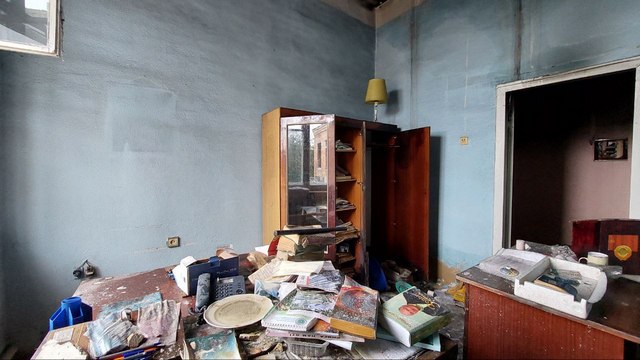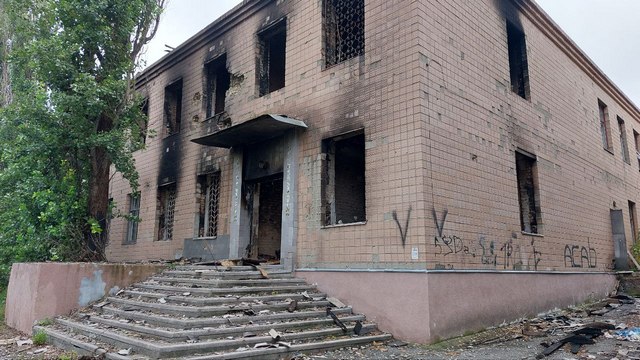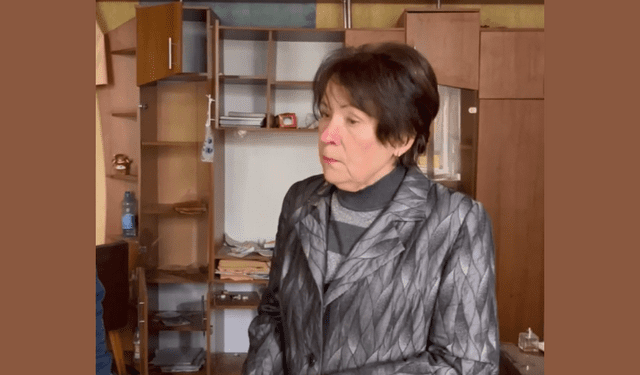Mariya Komar, the chief editor of the Vpered newspaper from Borodyanka, shares her experiences of hiding from Russian invaders, witnessing the destruction of her home, and, most heartbreakingly, the devastation of the newspaper’s offices. She guided correspondents from the National Union of Journalists of Ukraine (NUJU) through the damaged building, highlighting the extent of the damage caused by the invaders.
“Our territorial defense fought back against the invaders, and for that, they destroyed everything they saw.”
— Be careful here, – warns Mariya Komar, leading the NUJU correspondents through the dark corridors of the battered building.
She uses a flashlight to light the way as she provides a mini-tour. She points out once functional rooms, like the former proofreading area, where buckets filled with frozen water now stand. The ceiling leaks, rendering the buckets ineffective. The walls, once adorned with paintings by a local artist, and the reception area are now in ruins. Mariya recalls that visitors to the newspaper used to take off their shoes due to how clean and well-maintained the space was.
— This is my editorial office, — Mariya says with tears in her eyes, struggling to hold back her emotions. — My second home, where I worked for decades… all ruined. Iron bars hang from the ceiling… The furniture is damaged… There are only a few small dry patches. That’s where the archives miraculously survived, and I took them home. The Russians entered Borodyanka in the first days of the full-scale invasion. Our territorial defense fought back against the invaders, and for that, they destroyed everything they saw.
The central street, called Centralna, suffered particularly, as the building housing the Vpered newspaper’s offices is located there.
— Computers were smashed, equipment was destroyed, and laptops were stolen. Mariya ‘s work chair and the accountant’s chair were also taken. The invaders even took a broom; the extent of the destruction was severe.

Additionally, the Russian occupiers used the newspaper’s offices for parties, consuming whatever supplies were present due to the upcoming anniversary of the newspaper’s founding on February 25. They utilized the newspaper’s offices for their purposes, including fulfilling their basic needs like going to the bathroom.
— They ‘occupied’ and ‘relaxed’ wherever they could. They had these breaks between plundering and shelling civilian homes… They turned the area near the pension fund into a barbecue spot and took out tables— Mariya recounts the misconduct of the Russian invaders.
“While our apartment was not hit, living in the building is still impossible.”
As the full-scale war began, Mariya Komar and her team diligently performed their duties and managed to publish the newspaper. It was a special anniversary issue, highly anticipated by readers. However, due to the circumstances, it was only published at the end of May, and Mariya personally distributed copies on the streets. February and March were too turbulent for newspapers – survival was the priority.
— The lines for bread were long. By the way, on the 25th [of February], I also stood in line and bought a few loaves – I waited for three hours— Mariya remembers the early days of the invasion. — Those three loaves saved us. We didn’t leave. So, with one loaf, we managed for 20 days. That’s how it was.
Mariya and her family moved to a house in the private sector, understanding the danger of staying in a multi-story apartment building. They knew that the FSB (Russian Federal Security Service) agents would come to visit, as journalists were being scrutinized and recruited primarily. Journalists had information on everything happening in the community. And Mariya‘s predictions came true: agents later searched her apartment while she was hiding in a basement 100 meters away. From her hiding place, she witnessed the destruction of her building.

— The fire raged for three days, and we thought it would reach our apartment. But since ours is a corner apartment, it was spared, unlike the one in front of us. However, it’s still impossible to live in the building. An expert commission assessed the building’s unsuitability at 80 percent. I can’t even go into my apartment now. The impact was incredibly powerful. Where we currently live, everything was shaken. Windows fell off the veranda, and bathroom doors came off, the ceiling cracked,— Mariya shares. — According to official data, seven people died in their building. A family lived directly beneath her apartment: the man was a doctor, his wife a nurse, and their five-year-old daughter. They found the man’s body, but only bones remained of the woman and child. Reduced to powder…
Due to the stress, Mariyalost ten kilograms and is struggling to regain weight.
— How can you eat when you’re always on edge? When aviation began targeting civilians in our Borodyanka, that was the most terrifying— she sighs.
“We want to have a newspaper. And not just for our sake, but for the readers.”
Mariyadetailed her experiences in a comprehensive post-occupation article in the newspaper. She co-wrote it with a colleague who tragically lost her son. The National Union of Journalists of Ukraine (NUJU) helped print copies of the article. However, there is no place left to work on future newspaper issues. The newspaper’s building is currently deteriorating due to rain. The structure needs to be covered somehow, but funds are lacking.
— I went to the head of the local community and suggested covering it somehow,— Mariya laments. — But they didn’t listen to me, even though I went six times.
So, Maria Komar from Borodyanka eagerly awaits assistance to save her newspaper’s offices.
— We want to have a newspaper. And it’s not just our wish, it’s what the readers want. We’ll put in our effort but also hope for help. We won’t be able to manage the repairs and the newspaper on our own,— concludes Mariya Komar, the chief editor of the Vpered newspaper.
Journalist Mariya Komar, head editor of Vpered newspaper in Borodyanka, recounts the destruction caused by Russian invaders. She led correspondents through the devastated building, describing how invaders ravaged their offices after their territorial defense resisted. The invaders used the premises for parties and even basic needs. Maria’s apartment survived, but the building was unsafe due to damage. She hopes to help save the newspaper, reflecting readers’ wishes. Maria‘s experiences and struggles are portrayed in this post-occupation article she co-wrote.
This series, titled Executed Free Speech, is created as part of a project Drawing Ukrainian And International Audience’s Attention To Serious Violations Of Human Rights And Crimes Against Journalists And Mass Media By The Russian Federation, which is performed by the National Union of Journalists of Ukraine, with support from the Swedish non-profit organization Civil Rights Defenders.
JOURNALISTS ARE IMPORTANT. Stories of Life and Work in Conditions of War is a cycle of materials prepared by the team of the NUJU with the support of the Swedish human rights organization Civil Rights Defenders.
#CRD

 THE NATIONAL UNION OF
JOURNALISTS OF UKRAINE
THE NATIONAL UNION OF
JOURNALISTS OF UKRAINE
















Discussion about this post